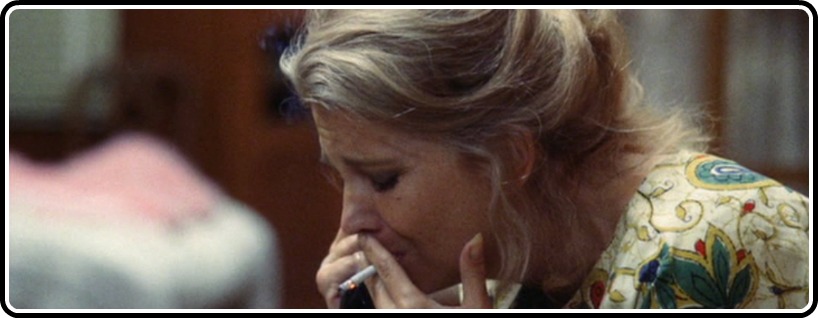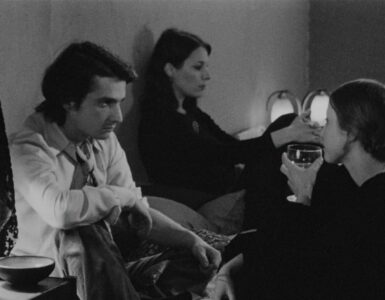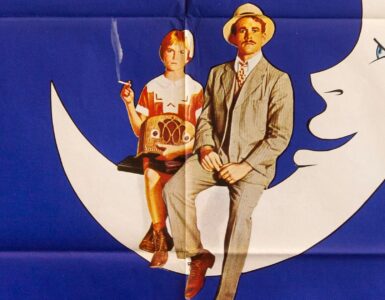When one thinks of John Cassavetes, at least when it comes to his work behind the camera, a handful of things instantly pop into mind. Be it his use of claustrophobic close up, or his appreciation for the use of high contrast cinematography, few things are more intrinsic to his style than his early, often times emotionally oppressive, use of black and white 16mm and 35mm film stock. With his two most energetic and resonant films, Shadows and Faces, using these type of film stocks to breath a disturbing level of realism and life into these improvisational looks at relationships on the brink, Cassavetes left black and white for good with his 1975 film, A Woman Under The Influence.
And sadly, while the film is solid, the results are not nearly the same.
As with any of Cassavetes’ best pictures, at this film’s core is a relationship on the verge. The film introduces us to Mabel, a mother and a wife, opposite her husband Nick. With the latter a hardworking middle class father of three, the former, Mabel, is beginning to go what the world seems to see as insane. When her behavior begins to strain their marriage, things begin to unravel for everyone involved, ranging from their three children to their friends. Spearheaded by two career-defining performances, this 155-minute long familial epic is both an enveloping meditation on sexual politics and love itself, while also being one of the more histrionic and cumbersome viewing experiences you’ll find.
Where Cassavetes himself was in many ways the star of the first two films in this Five Films box set, the performances in this third member absolutely stand up above his direction. Led by stars Gena Rowlands and Peter Falk, these two breathtaking turns have become the definitive performances for both of their careers. Rowlands gets the headlines here with her dense, tour de force performance as the titular woman under the influence, and for good reason. The actress and Cassavetes muse is in truly rare form here, taking what was originally envisioned as a stage performance and giving it the type of theatrical and bombastic sense of life that would have been fitting of a staged version of this melodrama. While the bigger moments may get the most notice, there is a great deal of subtlety behind her turn, and in those moments, this film becomes something truly powerful and bewilderingly resonant. Falk is equally as good here, particularly as the picture progresses and he and his wife’s relationship becomes more and more layered and tactile. The two play off each other with a brisk sense of realism that turn this film, despite its laughably over drawn runtime, into something that feels a tad less unwieldy, even if the performances themselves feel as though they are the definition of that word.
Aesthetically, the film is a bit more overbearing. Ostensibly comparing apples to oranges, this picture feels, like its previously mentioned runtime, over the top. With fine work from people like photographer Caleb Deschanel and art director Phedon Papamichael, the film itself lacks the real aesthetic and cinematic vitality that comes from Cassavetes’ earlier work. Inherently interesting to look at, there is something noticeably lacking here. Maybe it’s the kinetic use of whites and blacks or the grain so noticeable you feel like you could reach out and touch it, the sense of cinematic jazz that came in Cassavetes’ earlier work is not really anywhere to be found here. Instead, the performances take center stage and, thankfully, with the two leads at the height of their powers, the film thrives.
It’s also yet another bit of proof attempting to posit Cassavetes as the master of intrapersonal relationships. Very much a companion to the first two films in this box set, Influence is as thought provoking a look at what it means to truly love another person as there has ever been seen on the big screen. Rightly described in many ways as a rather spot on melodrama, there is a great layer of subtlety here that, despite ultimately running itself into the ground with its two-and-a-half hour runtime, turns this picture into something that may be overbearing, but ultimately deeply rewarding.
That all said, as usual, the transfer here is superb. Criterion’s HD restoration is breathtaking, really adding a lot to what is an oddly saturated picture. As with many of Cassavetes’ late pictures, the film’s photography is rather heightened, but it all really gets a new lease on life with this great restoration. There’s an audio commentary with sound recordist and composer Bo Harwood, who is joined by camera operator Mike Ferris for what is a rather entertaining and insightful commentary track. Both Rowlands and Falk sit down for a new conversation, and Cassavetes pops up for an interview, shot back in 1975. Toss in a gallery and a trailer, and you have a release that itself is rightly jam packed, but for a film that may be a bit tougher a watch than the previous two entries in this box set. Ultimately a rewarding meditation on love, this over long familial epic will not be everyone’s cup of tea, lacking a lot of what made a film like Faces or a picture like Shadows the real masterpiece that both have become known as. Come for the all-time great lead performances, stay for the harrowing discussion of real human love.






![Bergman Island (The Criterion Collection) [Blu-ray]](https://criterioncast.com/wp-content/uploads/2022/11/bergman-island-the-criterion-collection-blu-ray-400x496.jpg)
![This Is Not a Burial, It’s a Resurrection (The Criterion Collection) [Blu-ray]](https://criterioncast.com/wp-content/uploads/2022/11/this-is-not-a-burial-its-a-resurrection-the-criterion-collection-blu-ray-400x496.jpg)
![Lars von Trier's Europe Trilogy (The Criterion Collection) [The Element of Crime/Epidemic/Europa] [Blu-ray]](https://criterioncast.com/wp-content/uploads/2022/11/lars-von-triers-europe-trilogy-the-criterion-collection-the-element-of-400x496.jpg)
![Imitation of Life (The Criterion Collection) [Blu-ray]](https://criterioncast.com/wp-content/uploads/2022/11/imitation-of-life-the-criterion-collection-blu-ray-400x496.jpg)
![The Adventures of Baron Munchausen (The Criterion Collection) [4K UHD]](https://criterioncast.com/wp-content/uploads/2022/11/the-adventures-of-baron-munchausen-the-criterion-collection-4k-uhd-400x496.jpg)
![Cooley High [Criterion Collection] [Blu-ray] [1975]](https://criterioncast.com/wp-content/uploads/2022/11/cooley-high-criterion-collection-blu-ray-1975-400x496.jpg)